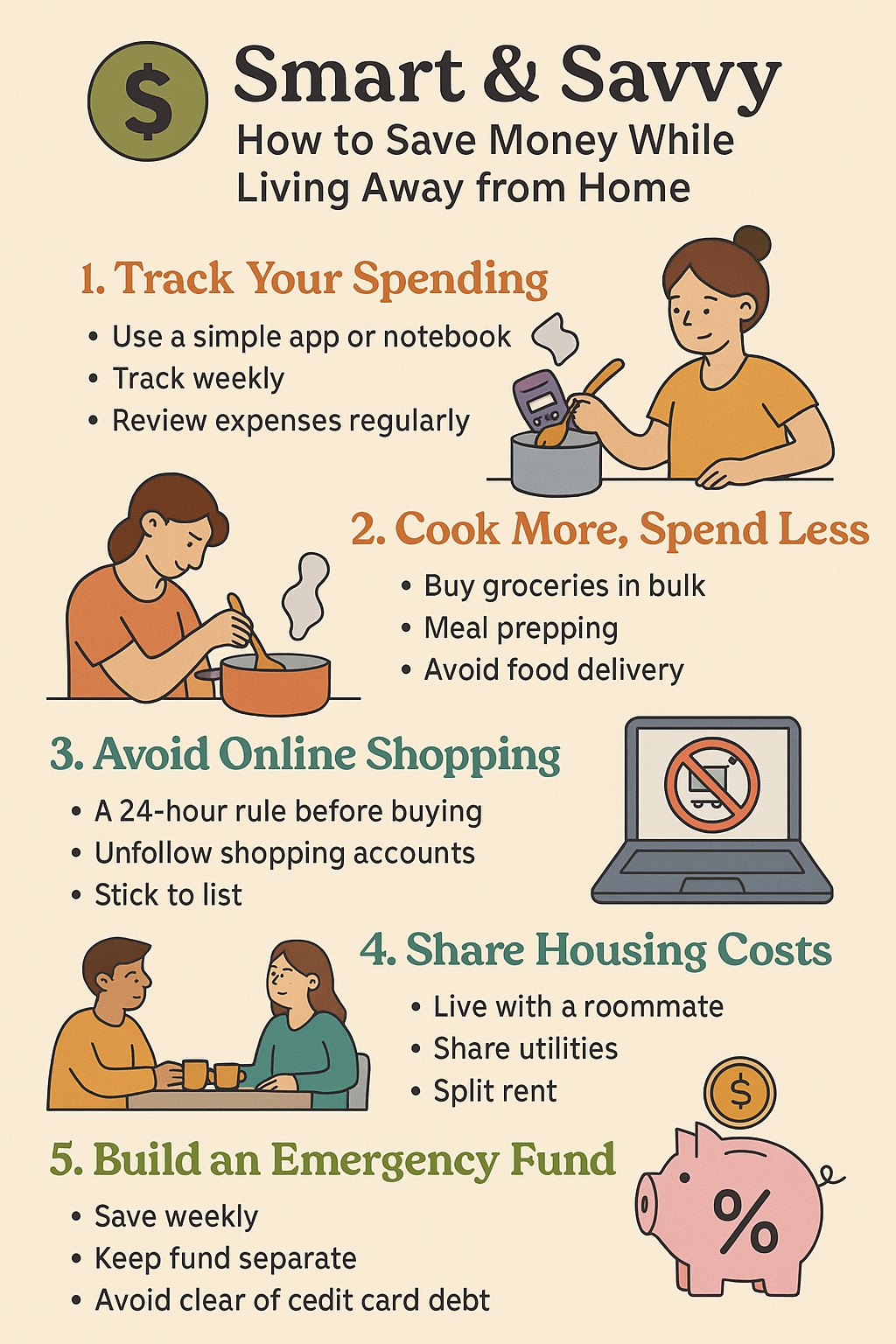Because adulting is hard enough—your wallet shouldn’t suffer too.
Living away from home comes with freedom, late-night snacks, and no one telling you when to sleep—but it also comes with surprise bills, food costs, and rent that drains your bank account faster than you’d think. The good news? Saving money isn’t about cutting all the fun—it’s about building small, smart habits that actually give you more freedom long term.
Here’s your practical guide to saving money while still enjoying your life.
1. Start by Tracking Every Rupee (or Dollar)
You can’t fix what you don’t know. Most people don’t realize how much they’re spending until they actually track it. So before you make a budget, start by writing down every expense—even that Rs. 99 coffee or random Amazon buy.
Try this:
- Use free apps like Walnut, Money Manager, or even Google Sheets
- Track weekly instead of monthly so it’s not overwhelming
- Review your spending every Sunday night (make it a ritual!)
Why it works:
- Helps you spot patterns and money leaks
- Makes budgeting feel doable, not scary
- Encourages mindful spending
2. Cook More, Spend Less (And Eat Healthier Too)
Ordering food every day might feel convenient, but it’s one of the biggest money drains. Cooking at home, even basic meals, can cut your food budget in half—and it’s better for your health.
Try this:
- Cook in bulk on Sundays (think: rice, curries, pasta sauces)
- Buy staples like dal, oats, and frozen veggies in bulk
- Use simple 3-ingredient recipes to avoid burnout
Why it works:
- Meal prepping saves time during busy weekdays
- Cooking with roommates = fun + shared grocery bills
- Homemade food is cheaper, cleaner, and satisfying
3. Say No to Mindless Shopping Sprees
Impulse buying online? We’ve all been there. But “just browsing” leads to just broke. That dopamine hit from a cart checkout fades fast, but the financial hangover stays.
Try this:
- Follow the “24-hour rule” before buying anything online
- Unfollow tempting shopping pages on Instagram
- Only buy what’s already on your planned shopping list
Why it works:
- Cuts down emotional and late-night purchases
- Helps you spend with intention, not impulse
- Saves money for things that actually matter
4. Split Rent and Share Resources
Living solo sounds dreamy, but your wallet might not agree. Sharing your space can cut housing costs by 30–50%, and give you more to spend (or save) elsewhere.
Try this:
- Look for roommates on trusted platforms (Facebook groups, local student forums)
- Share bills: Netflix, groceries, laundry detergent—everything adds up
- Use apps like Splitwise to manage shared expenses fairly
Why it works:
- Less pressure to afford high rent alone
- Shared utilities = shared savings
- Bonus: built-in social life if your roommate’s cool
5. Avoid Debt, But Build an Emergency Fund
Credit cards may seem like a savior in tight months—but they often lead to stressful debt traps if not used wisely. Instead, focus on building a small emergency fund for surprise expenses.
Try this:
- Save a small fixed amount weekly—even ₹100 adds up
- Keep a separate digital wallet just for emergencies
- Avoid “Buy Now, Pay Later” schemes unless you have a repayment plan
Why it works:
- Reduces anxiety about broken phones, late fees, or medical bills
- Gives you freedom to say “no” when you can’t afford something
- Helps avoid long-term interest charges and penalties
6. Use Discounts, Cashback & Freebies (It’s Not Cheap—It’s Smart!)
Why pay full price when you don’t have to? Student discounts, referral codes, and cashback offers are everywhere—you just need to look.
Try this:
- Use Chrome extensions like Honey or CashKaro for cashback
- Check for student plans on Spotify, Microsoft, or even Dominos
- Attend free college events for food, goodies, or networking
Why it works:
- Lets you enjoy fun stuff without guilt
- Encourages smarter digital shopping
- Gives the joy of saving without the stress of “missing out”
Final Thoughts: Build Habits, Not Restrictions
You don’t have to live like a monk to save money. You just have to be a little more aware, a little more intentional, and a lot more clever. The small habits you build now—budgeting, cooking, sharing—will help you stay independent, stress-free, and financially confident for life.
Remember: Living smart is cooler than living broke.

